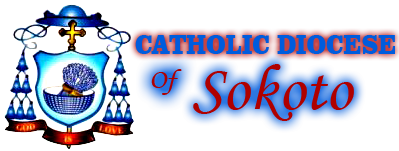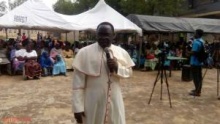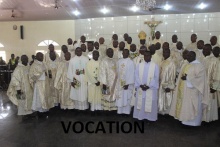There is something outstanding about the Catholic Bishop of Sokoto, Northwest Nigeria, Dr. Matthew Hassan Kukah. His education spans across many disciplines, notable among them leadership and politics in Nigeria. This possibly propels him to continue to work for peace and conflict resolution despite the murky waters of Nigerian politics.
He speaks to politicians, engages in constructive criticisms when those in power don’t get it right so as to help them retool the machinery of governance. He equally commends what is rightly done by those in power. In the midst of all he does, Bishop Matthew Hassan Kukah never failed to work hard to bring to the round table for discussion those known to be in disagreement that may translate to violence.
In 2003 when Muhammadu Buhari made a foray into politics to vie for the Presidency of Nigeria, he was widely taken to task on a statement credited to him in November 2001 to the effect that “Muslims should not vote for non-Muslims in elections in Nigeria”. As a student of leadership and politics, Dr. Hassan Kukah, then a priest of the Archdiocese of Kaduna had in several analyses, put the statement in context to explain that General Buhari was misunderstood. The unsolicited and subtle effort by the then Fr. Matthew Kukah, sort of brought great relief to General Buhari.
Bishop Kukah speaks truth to power as Shepherd of the people of God. He was involved in Nigeria’s Oputa Panel for truth and reconciliation. He played great role in the Niger-Delta challenge. He also set up the Kukah Centre based at Abuja to continue with the role of enhancing and encouraging citizen engagement in Nigeria, promoting conflict resolution, and translating the ideals of democratic and responsible political leadership. The Centre has mitigated in challenging issues since its establishment. The most notable of the efforts of the Centre was to convene and midwife the famous National Peace Committee that worked towards the peaceful transition of governance from President Goodluck Jonathan to General Muhammadu Buhari in 2015.
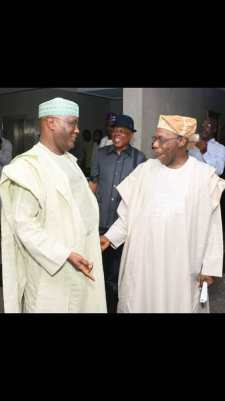
The rift between former President Olusegun Obasanjo and his Vice-President Atiku Abubakar was not lost on Bishop Matthew Hassan Kukah. In view of respect he enjoys as an unbiased and non-partisan intermediary, Bishop Kukah continued to encourage Olusegun Obasanjo and Atiku Abubakar to bury the hatchet. The effort which had been on over the past few years, climaxed in reconciliation recently at Abeokuta between Obasanjo and Atiku in the presence of Bishop Matthew Kukah who initiated the action and Sheikh Mahmoud Gummi who was brought in by Chief Olusegun Obasanjo. Interestingly, the photograph taken to mark the reconciliation has been misinterpreted to appear as if the two clerics “endorsed Atiku’s partisan political interest”.
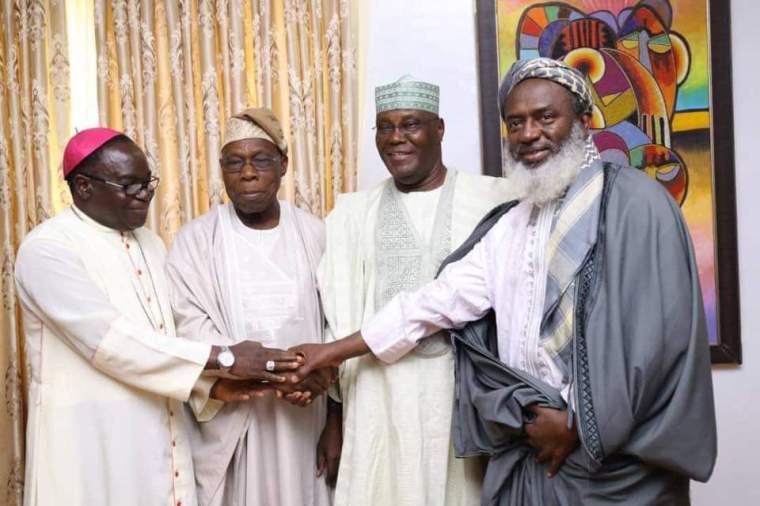
In a four-page piece on the reason for his presence at Abeokuta recently after his engagement with the Foursquare Gospel Church in Lagos and his role in the meeting at Abeokuta, Bishop Kukah said that directly his major focus which was reconciliation of the two great actors at the helm of affairs in Nigeria from 1999 to 2007 was concluded, he left Abeokuta to return to his diocese.
My sympathy lies with the man, Bishop Matthew Hassan Kukah. He has high hopes for a great, progressive and united Nigeria. His actions are misunderstood and misinterpreted most times by political sycophants who want to make political capital out of such deliberate misinterpretation, especially for favor from their political masters. Kukah was widely praised and cited in the past when he kept harping on the low side on the Jonathan administration. However, when he noticed the gradual slide into violence in Nigeria and grinding poverty without the Buhari government doing anything to stem it; and also calling Buhari’s attention to the fact that fighting corruption should go along with other activities to stem poverty, sycophants who wanted to be in the government’s ‘good books’, criticized Bishop Kukah for daring to speak such truth to power. With time, Bishop Kukah has been vindicated.
One of the amazing things about Bishop Matthew Hassan Kukah is that in all these, he is not out to seek popularity. He is conscious of his role as priest and the line in the Catholic Church’s Code of Canon Law which no priest must cross as it has to do with participation in partisan political activities. This piece from his 4-page write up recently is instructive: “It will be against the principles of the Code of Canon Law of the Catholic Church which regulates our public life in the political space. The President of the Catholic Bishops’ Conference has signed a statement to the effect that no altar of the Catholic Church must ever be open to any politician, something we have all taken seriously”.
Will most Nigerians really understand the thoughts of Bishop Matthew Hassan Kukah as he prays for and works towards getting the citizens to know themselves and take their fate in their hands? Time shall tell.
